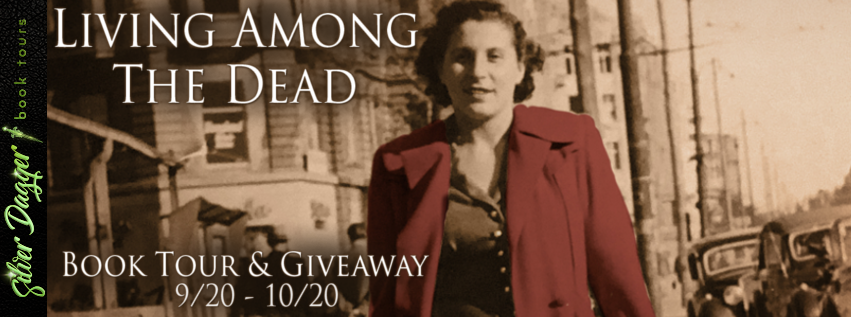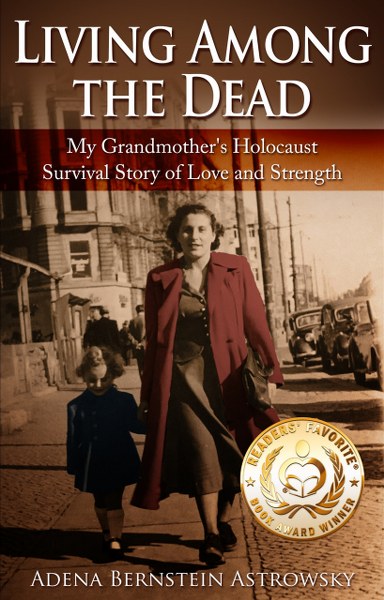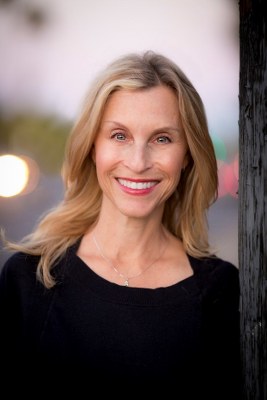Living Among the Dead: Holocaust Survivor True Stories by Adena Bernstein Astrowsky ➱ Book Tour with Giveaway
Living
Among the Dead:
My
Grandmother's Holocaust Survival Story of Love and Strength
Holocaust
Survivor True Stories WWII Book 3
by
Adena Bernstein Astrowsky
Genre:
Biography, Memoir
This
is the story of one remarkable young woman's unimaginable journey
through the rise of the Nazi regime, the Second World War, and the
aftermath. Mania Lichtenstein’s dramatic story of survival is
narrated by her granddaughter and her memories are interwoven with
beautiful passages of poetry and personal reflection. Holocaust
survivor Mania Lichtenstein used writing as a medium to deal with the
traumatic effects of the war.
Many
Jews did not die in concentration camps, but were murdered in their
lifelong communities, slaughtered by mass killing units, and then
buried in pits. As a young girl, Mania witnessed the horrors while
doing everything within her power to subsist. She lived in
Włodzimierz, north of Lvov (Ukraine), was interned for three years
in the labor camp nearby, managed to escape and hid in the forests
until the end of the war.
Although
she was the sole survivor of her family, Mania went on to rebuild a
new life in the United States, with a new language and new customs,
always carrying with her the losses of her family and her
memories.
Seventy-five
years after liberation, we are still witnessing acts of cruelty born
out of hatred and discrimination. Living among the Dead reminds us of
the beautiful communities that existed before WWII, the lives lost
and those that lived on, and the importance to never forget these
stories so that history does not repeat itself.
*2020
Reader's Favorite Gold Medal Winner in the Non-Fiction – Biography
Genre!!
What do you think about the general knowledge about the Holocaust?
Like most members of my generation, born three decades after the end of World War II, I came to my own story with almost no real understanding of the plight of Jews in the Holocaust, much less that of my own grandmother. With no real, personal connection to the Holocaust, I think it is unrealistic to expect others to have much more than a brief, general understanding of the Holocaust. Unfortunately, as time goes on, this will be even less so. I am very grateful that in my home state of Arizona, legislation is currently being considered to make Holocaust education mandatory. The Holocaust Education bill has passed in the House of Representatives and then will need to be voted on in the Senate before being sent to our state’s Governor to sign it into law. Should this get accomplished, children will be required to learn about the Holocaust as part of the school’s curriculum.
Writing biography as a memoir will become a new genre of books that will be both unique and important for future generations. With the passing of time, and fewer Survivors living, we will have less and less memoirs dedicated to detailing their stories of survival in the first person. As such, we will become more dependent on others to write these non-fiction books outlining the events that took place during the Holocaust. Likely, more second and third generation survivors will need to take over the task of learning the Survivor’s history, doing the research, and writing their story. Doing so will be imperative in order to keep their stories alive and help future generations by learning what is at stake if we don’t stand up against discrimination.
In a nutshell, my grandmother’s story is about a 17-year-old girl who was living in a beautiful community surrounded by friends and close family. As the Nazi regime gained power and Jews were targeted her entire life changed in an instant. She went from being shy and the youngest in her family to being an orphan, alone, and having to fend for herself. Miraculously, she was able to survive three pogroms and escape to the forest where she met some others in hiding. From there she was liberated and eventually emigrated to Canada with her husband, another Survivor she met in the forest, and their young girl. From Canada she moved to the United States and before she passed away, her family totaled 2 daughters, 5 grand-daughters, and 9 great-grandchildren. She left behind beautiful passages of poetry and prose written about her life in Europe, the Holocaust, and her feelings.
Hatred and bigotry led to the worst genocide in world history. While there are so many lessons to be learned from the Holocaust, and while we would expect to see more empathy and understanding today, instead, hatred and violence are on the rise. Jews are being targeted and anti-semitism is as real today as it was during WWII. As we get farther and farther removed from the Holocaust, trying to apply the lessons of the past when facing the issues of today has become a real challenge. We must keep these stories alive as they provide detailed information, a chance for a young reader to connect personally, with the story of a Survivor. We need a constant reminder of what unchecked hatred can lead to. And that’s why testimonials and stories such as my grandmother’s are so important today. They speak of hope, resilience, love, and determination.
Bubbie was a daughter, sister, wife, mother of two, grandmother of !ve, great-grandmother of ten. And she was a Holocaust Survivor. This is about her life — or at least the bits and pieces of that life that she shared with me in conversations and in her writings. She spoke of her earliest childhood memories and of living through the Holocaust. Her story is now history. But, because she somehow miraculously survived horri!c events and unimaginable degradation, her family, her faith, and her hope — they survive, too. Like most members of my generation, born three decades after the end of World War II, I came to this story with almost no real understanding of the plight of Jews in the Holocaust, much less that of my own grandmother.
The first real signs of danger that Bubbie experienced from the Nazis were derogatory statements on the radio, as well as from strangers on the streets. They would spew hateful commands exclaiming, “Jews, go to Palestine! Jews, go to Palestine!” They wanted the Jews to leave their hometown. She then heard rumors that the Poles, who at that time had authority in her city, were gathering Jews and sending them to Madagascar or Africa. 43 My grandmother viewed Madagascar as this “strange, fun place.” Her family knew it was in Africa and was, in her mind, probably wild and savage. Still, they thought maybe it would likely be better there than where they were currently living. Regardless, her family made no attempt to leave the country nor did anyone else they knew. It was not that they wanted to stay, but they did not have any other place to go. Besides, they had little money, and more importantly, this was their place, their home.
Additionally, she told me that no one believed the Nazi regime would be so bad. They were in complete denial that the Nazis would actually set out to wipe an entire group of people o# the face of the planet.
Money and other valuables that used to be considered precious no longer had signi#cance or meaning to them. All of these precious items had to be given to the Germans. “A degrading scene of robot-like people, bent under the heavy weight of their load, their faces re&ecting grief, lined up to deliver as told, items so precious once, and so worthless in the face of death.” Bubbie wrote, “To give up one’s candlestick, an inheritance which remained in families for generations and were without fail lit every Friday night, was a distinct sign of destruction of the Jewish home.” This is true when for centuries, generations after generations, families light the Sabbath candles every Friday evening. The antique candlesticks I received as a wedding gift, for example, are lit every Friday night that we are all home as a way to welcome in the Sabbath.
The Jewish people who lived in the larger living ghetto were useful to the Germans in terms of labor. Therefore, they were kept alive — at least for some time. These Jews had special skills that the Germans needed, such as shoemakers, candle makers, etc. Rivka was able to produce a piece of paper for their father listing him as a bricklayer, although he actually had no skills laying bricks, so they were placed in the living ghetto. Those placed in the dead ghetto knew they were doomed.
My grandmother told me that somehow, because of “fate,” their roof was not torn apart, and she, and the others, remained alive. The courageous family whose house they were hiding in brought them a bag of biscuits to share. There was also a sack of peas, a raw potato, and a few pieces of zwieback, a dry bread. They did not know how long they would be there.
Adena
Astrowsky has dedicated her career to helping the most vulnerable of
our society. She did this by prosecuting child sexual abuse cases and
domestic violence cases within the Maricopa County Attorney’s
Office. She became the local expert concerning the prosecution of
domestic violence related strangulation cases and taught extensively
on that subject. Currently, she handles post-conviction cases on
appeal and foreign extradition cases. Adena taught Sunday School at
her temple for eight years, and in her last two years she co-taught
"Character Development Through the Studies of the Holocaust."
Adena contributes articles to MASK (Mothers Awareness on School-age
Kids) Magazine, often writing about children's safety, drugs, law and
order, etc. Once a month Adena volunteers at a local Scottsdale
library with her therapy dog, Charlie, as part of the Tail Waggin'
Tales Program. Adena has also chaired events to raise money for the
Emily Center of Phoenix Children’s Hospital. Adena’s greatest
role, however, is as the mother of three very active children. She,
and her husband, Brad, are kept very busy with their respective
dance, theater, music, and athletic activities.
$25
Amazon giftcard – 1 winner,
ebook of Living Among the Dead – 3
winners!
Join us on Tour with Guest Post & #Giveaway
#livingamongthedead #memoir #holocaust #biography #adenabernsteinastrowsky #kindleunlimited









Comments
Post a Comment